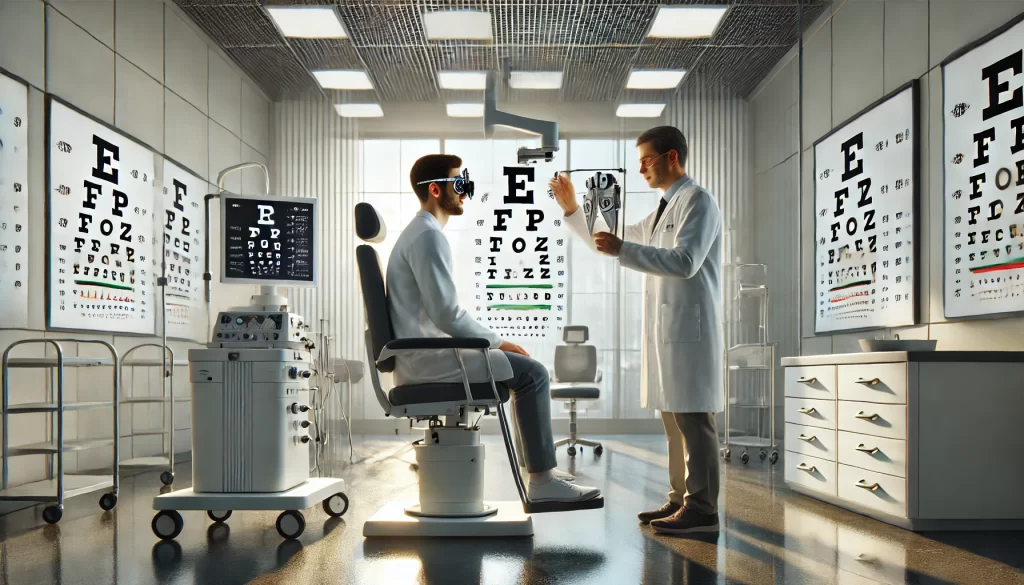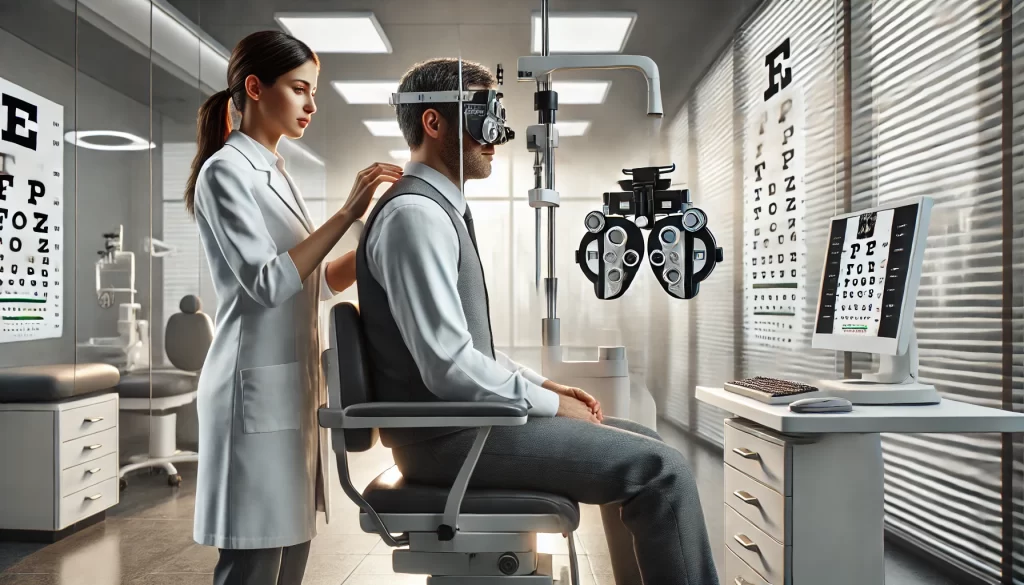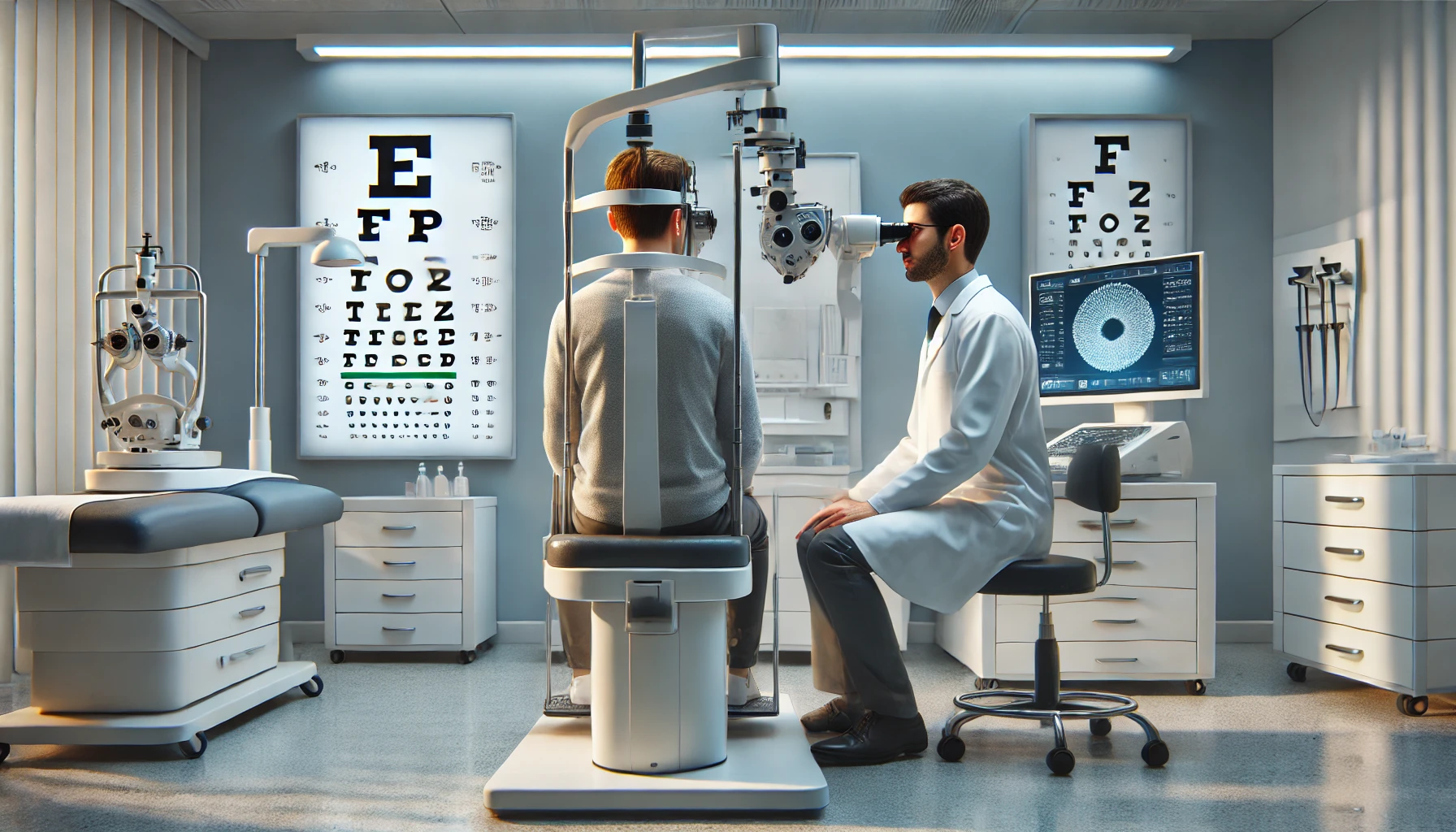Table of Contents
If you’ve ever wondered, “How long does an eye exam take?” you’re not alone. Many people feel nervous about eye exams, thinking they might take too long or be uncomfortable. An eye exam is a simple process that plays a crucial role in maintaining eye health. In this article, we will reveal everything you need to know about the duration of an eye exam, what to expect, and why it matters. Read on to discover the shocking truth about how quick and easy it can be to safeguard your vision.
What is an Eye Exam?

How long does an eye exam take? An eye exam is a series of tests conducted by an optometrist or ophthalmologist to evaluate your vision and identify potential eye problems. These exams are crucial for detecting issues early, preventing them from getting worse. Regular eye exams are essential for everyone, not just those who wear glasses or contact lenses, to maintain healthy vision and protect their eyesight.
Why Are Eye Exams Important?
Eye exams do more than check your ability to see clearly. They can detect underlying health issues like glaucoma, cataracts, and diabetes. Often, people don’t realize they have vision problems because their eyes adjust to subtle changes over time. Regular exams catch these issues before they become serious, making it essential to check your eyes at least once every two years or more frequently if your eye doctor recommends.
How Long Does an Eye Exam Take?

So, how long does an eye exam take? Typically, a standard eye exam lasts between 20 to 60 minutes, depending on the test’s complexity. The process is straightforward, and most people are surprised at how quickly it can be done.
Variables that Impact How Long an Eye Exam Takes
There are a few factors that can influence how long does an eye exam take:
- Age: Younger children and older adults may require more time as their vision can change more frequently.
- Health Conditions: If you have underlying health issues like diabetes or high blood pressure, your eye doctor may spend extra time checking for any signs of related eye problems.
- Type of Exam: A basic eye exam will take less time than a more thorough one involving dilation or specialized eye disease tests.
Knowing these factors can help you better understand why some eye exams take longer than others.
What Happens During an Eye Exam?
The actual steps involved in an eye exam are designed to be comfortable and straightforward. Here’s what typically happens:
Vision Tests
The first part of the eye exam usually involves reading letters on a chart to measure how well you can see at different distances. This helps the doctor determine if you need glasses or if you need a change in your prescription.
Eye Muscle Movement
Your eye doctor will check how well your eye muscles move by having you follow an object with your eyes. This ensures that both eyes are working together correctly.
Pupil Response
A light will shine in your eyes to see how your pupils respond. This helps check for any issues related to how light enters your eyes.
Refraction Test
During this test, the eye doctor will have you look through a phoropter device showing different lenses. You will be asked which lens makes an image more transparent, helping to refine your prescription.
Eye Health Check
Your doctor will examine the internal structures of your eye using special instruments. This part of the exam can detect early signs of conditions like cataracts, macular degeneration, or glaucoma.
Do Different Types of Eye Exams Take Longer?
The time it takes for an eye exam can vary based on the type of exam. Let’s explore a few common types:
Routine Eye Exam
A routine eye exam is the most common and takes around 20 to 30 minutes. It includes basic vision tests, a refraction test, and an eye health check. This exam is excellent for people who need to update their prescriptions or check their eye health.
Contact Lens Exam
If you want contact lenses, the eye doctor will do additional tests to check how well the lenses fit your eyes. This can add 15 to 20 minutes to the exam. You’ll also receive advice on how to care for your lenses.
Comprehensive Eye Exam
An examination of the entire eye can take up to one hour. It includes all the tests of a routine exam plus additional ones, like eye dilation, which allows the doctor to see more of your retina. This exam is recommended for older adults or those with a family history of eye diseases.
How to Prepare for Your Eye Exam
Preparation is critical to making sure your eye exam goes smoothly. The following advice will help you make the most of your appointment:
- Bring your glasses or contact lenses: If you wear corrective lenses, bring them along. This helps the doctor compare your current prescription with your new one.
- List any medications: Some can affect your eyesight, so inform your eye doctor about any drugs you are taking.
- Note any eye problems: If you’ve noticed any changes in your vision, such as blurry sight or floaters, let your doctor know. These symptoms could signal an underlying issue.
Also Read: How Does the Nervous System Maintain Homeostasis? A Vital Secret Revealed
What Happens After the Eye Exam?
Following the completion of your eye test, your doctor will talk with you about the findings. You might need new glasses or contact lenses if your prescription has changed. In some cases, if the doctor finds any eye health issues, they may recommend further tests or treatments.
Do You Need Glasses After an Eye Exam?
One of the most common questions people ask after an eye exam is whether they need glasses. If you have trouble seeing clearly or your prescription has changed, the doctor will advise you to get new glasses or update your lenses. However, not everyone will need glasses, especially if the exam shows that your vision hasn’t changed significantly.
So, how long does an eye exam take? In most cases, an eye exam takes between 20 to 60 minutes, depending on the complexity of the tests. Regular eye exams are vital for maintaining good eye health and catching potential issues early. Whether it’s a routine check or a more comprehensive exam, your eye health is worth the time spent. Schedule your eye exam today to keep your vision in top shape.

